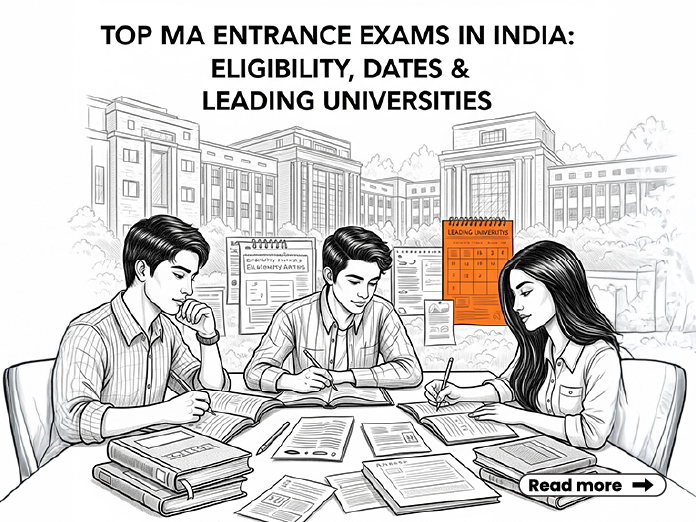- Why Choosing the Right Postgraduate Programme Matters?
- What Is M.A. Political Science?
- Who Should Consider M.A. Political Science?
- What Do You Study in M.A. Political Science?
- Why Political Science Is a Game-Changer in Society & Governance?
- Emerging Domains & Interdisciplinary Connections
- Top Skills You’ll Develop in M.A. Political Science
- M.A. Political Science Scope in Future: What’s Next?
- Internship, Policy Training & Research Opportunities
- Alumni Success Stories in Political Science
- How to Maximize Your Career After M.A. Political Science?
- Conclusion
- Frequently Asked Questions (FAQs)
Why Choosing the Right Postgraduate Programme Matters?
When it comes to higher education, selecting the right course plays a crucial role in shaping your career and intellectual growth. For students considering choosing M.A. Political Science, this decision is more than just an academic step – it is an investment in building a deeper understanding of governance, policy-making, and global affairs. The importance of PG courses lies in their ability to provide specialized knowledge, sharpen analytical thinking, and open pathways to diverse careers in research, administration, teaching, and international organizations.
Among the best postgraduate programmes, a master’s degree in Political Science stands out for its ability to blend theory with real-world applications. This programme provides in-depth exposure to the global political scenario, global governance, and contemporary challenges faced by societies worldwide. It also focuses on political philosophy, diverse political theories, and comparative political processes across nations. Students are encouraged to question, analyze, and develop critical thinking skills that prepare them for both academic and professional success.
With such a strong academic framework, pursuing this degree not only enriches your knowledge base but also builds the competencies needed to engage meaningfully with today’s complex political environment. For M.A. Political Science admission details and guidance on how to secure your seat, refer to the information provided below.
| Did you know? M.A. Political Science students at LPU study international relations, global governance, and comparative politics, preparing them to understand political systems worldwide. |
What Is M.A. Political Science?
The Master of Arts in Political Science is a two-year postgraduate degree designed for students who want to explore politics, governance, and international relations in greater depth. Through this programme, learners gain both theoretical insights and practical perspectives on how political systems function across the globe.
When looking at M.A. Political Science course details, the curriculum typically includes subjects like political philosophy, comparative politics, international relations, public administration, and contemporary global issues. This ensures that students not only understand the foundations of political thought but also acquire the tools to analyze current political developments and policy frameworks.
As a political science postgraduate programme, it equips learners with advanced research skills, critical thinking abilities, and a deeper awareness of democratic processes, governance models, and institutional structures. Graduates of this programme often pursue careers in academia, civil services, public policy, journalism, research, or international organizations.
In short, the overview of M.A. Political Science highlights it as a comprehensive programme that blends academic rigour with practical exposure, making it one of the most sought-after postgraduate options for those interested in shaping and understanding political discourse at national and global levels.
| Did you know? Many LPU Political Science alumni have cleared UPSC, joined international organizations, and contributed to policy research, showcasing the real-world impact of the programme. |
Who Should Consider M.A. Political Science?
The eligibility for M.A. Political Science usually requires candidates to hold a bachelor’s degree in Political Science or a related discipline such as Public Administration, History, Sociology, or International Relations. Some universities also accept students from other academic backgrounds who demonstrate a strong interest in politics, governance, and policy studies.
But eligibility alone does not define suitability. It is equally important to understand who should study political science and what type of learners will benefit most from this programme.
This programme is ideal for:
- Students passionate about politics and governance – Those who want to gain in-depth knowledge of political systems, political thought, and governance structures.
- Aspirants for public services and competitive exams – Especially beneficial for students preparing for UPSC, state civil services, or similar exams where political science and general awareness play a key role.
- Future academicians and researchers – Individuals who aim to pursue a Ph.D., teaching positions, or research roles in think tanks and universities.
- Professionals seeking careers in international organizations – Those who aspire to work in NGOs, UN bodies, policy-making institutions, or global governance organizations.
- Students interested in media, law, or diplomacy – Since the programme develops critical thinking and analytical skills, it is highly relevant for careers in journalism, legal studies, and diplomatic services.
- Socially conscious individuals – Suitable for candidates motivated to engage with issues such as democracy, human rights, social justice, and international peace.
In summary, the suitable candidates for M.A. Political Science are those who combine academic interest with career goals in governance, research, teaching, policy-making, or international affairs. This programme not only strengthens subject knowledge but also sharpens analytical, leadership, and decision-making skills essential for impactful careers.
| Did you know? Graduates gain analytical and governance skills, critical thinking, and communication abilities, preparing them for roles in civil services, public policy, international organizations, and media. |
What Do You Study in M.A. Political Science?
The M.A. Political Science syllabus is designed to provide a balanced mix of theoretical knowledge and practical exposure to politics, governance, and international relations. Covering both classical and modern areas of study, it prepares students with the skills needed for academic research, civil services, teaching, policy-making, and global career opportunities.
The programme introduces students to a wide range of political science subjects, which include:
- Political Theory and Philosophy – Understanding the evolution of political thought.
- International Relations – Theory, practice, and global governance challenges.
- Indian Political Thought & Institutions – Exploring India’s political heritage and present systems.
- Public Policy and Governance – Policy-making frameworks and their real-world applications.
- Western Political Thought – Key ideas and thinkers shaping modern democracies.
- Peace and Conflict Resolution – Approaches to building global harmony.
- Comparative Political Analysis – Studying governance models across nations.
- Research and Academic Writing – Developing strong research, dissertation, and publication skills.
The curriculum of M.A. Political Science also allows students to choose specialization electives such as Development Studies, Gender Studies, and International Relations, along with generic electives that provide interdisciplinary exposure.
Electives Offered
- Specialization Electives: Development Studies, Gender Studies, International Relations
- Generic Electives: Interdisciplinary courses from other fields, providing wider academic exposure
programme Outcomes & Features
- Field surveys and NGO visits for real-world socio-political insights
- Seminar-based learning to improve critical thinking and reasoning ability
- Research-focused curriculum with training in publication ethics, academic writing, and dissertation work
- Support for UGC-NET preparation through dedicated teaching and research aptitude courses
By combining political theory, policy studies, and hands-on research, the curriculum ensures students develop critical thinking, analytical skills, and professional readiness for careers in governance, academia, and international organizations.
Why Political Science Is a Game-Changer in Society & Governance?
The role of political science goes far beyond classrooms and textbooks—it shapes the way societies function and governments operate. By studying political ideas, institutions, and policies, students gain insights into how decisions are made, power is exercised, and citizens engage with their governments.
One of the key aspects of this discipline is its importance in governance. Political Science equips individuals with the ability to analyze public policies, evaluate administrative structures, and understand the dynamics of law-making. This makes it essential for designing effective governance models that ensure transparency, justice, and inclusiveness.
The political science impact on society is also profound. It fosters critical thinking, encourages informed citizenship, and empowers individuals to participate actively in democratic processes. From promoting human rights and gender equality to addressing issues of peace, conflict, and sustainable development, Political Science helps create responsible leaders and informed citizens who can bring about social change.
In today’s interconnected world, where political decisions have global consequences, Political Science stands as a transformative discipline that bridges the gap between theory and practice, making it a true game-changer in both society and governance.
| Did you know? M.A. Political Science students at LPU study international relations, global governance, and comparative politics, preparing them to understand political systems worldwide. |
Emerging Domains & Interdisciplinary Connections
Political Science is no longer confined to the traditional study of governance, elections, or political theory. The field has grown to include new domains in political science, addressing contemporary challenges and global issues that intersect with multiple disciplines.
Key Emerging Areas in Political Science:
- Digital Governance & Cyber Politics: Understanding the role of technology in policy-making, e-governance, and cybersecurity regulations.
- Environmental and Climate Policy: Examining political frameworks and policies for sustainable development and climate action.
- Global Diplomacy & International Relations: Focus on global governance, international negotiations, and transnational conflicts.
- Conflict Studies & Peacebuilding: Studying strategies for resolving civil conflicts, terrorism, and regional disputes.
- Policy Analytics & Public Administration: Using data-driven approaches to improve governance, budgeting, and social programmes.
Interdisciplinary Approach:
Through political science interdisciplinary studies, students combine knowledge from Economics, Sociology, Law, Gender Studies, and Development Studies. This approach allows them to:
- Analyze social and economic issues through a political lens.
- Understand the impact of policy on marginalized communities and social equity.
- Develop practical solutions to complex societal problems.
Advantages of Exploring Emerging Areas:
- Prepares students for versatile career options in research, diplomacy, policymaking, NGOs, think tanks, and international organizations.
- Enhances critical thinking, decision-making, and problem-solving skills.
- Provides exposure to both domestic and global political trends, making students industry-ready.
- Encourages innovation and adaptation in responding to modern political and governance challenges.
By exploring emerging areas and integrating interdisciplinary learning, Political Science students gain the knowledge, skills, and perspective needed to navigate today’s complex political, social, and global landscape—making the programme more relevant than ever.
Top Skills You’ll Develop in M.A. Political Science
Pursuing an M.A. in Political Science equips students with a diverse set of competencies that are highly valuable in both academic and professional domains. The programme is designed to enhance knowledge while fostering critical thinking, problem-solving, and practical skills relevant to governance and public policy.
Key skills students develop include:
- Research Skills in Political Science: Students gain advanced research skills in political science, including data collection, field surveys, statistical analysis, academic writing, and dissertation development. These skills prepare graduates for research-oriented careers in academia, think tanks, and policy institutes.
- Analytical and Governance Skills: The programme strengthens analytical and governance skills, enabling students to evaluate policies, study political trends, and assess administrative systems. These skills are essential for roles in government, civil services, public policy, and international organizations.
- Critical Thinking and Problem-Solving: Students learn to critically analyze political theories, societal issues, and global events, developing the ability to propose practical solutions to complex challenges.
- Communication and Leadership: Through seminars, presentations, workshops, and group projects, students refine their oral and written communication, negotiation, and leadership abilities.
- Digital and Policy Analysis Skills: Exposure to workshops on digital governance, public policy evaluation, and global political scenarios enhances students’ ability to work with modern tools and frameworks in political research and governance.
- Interdisciplinary Competence: With elective courses in Gender Studies, Development Studies, and International Relations, students acquire the ability to approach political issues from multiple perspectives, broadening their problem-solving and strategic thinking capabilities.
In summary, the skills after M.A. Political Science prepare graduates for diverse career paths—ranging from research, teaching, and civil services to policy-making, diplomacy, journalism, and international consultancy—making them well-rounded professionals ready to contribute meaningfully to society.
M.A. Political Science Scope in Future: What’s Next?
The future scope of M.A. Political Science is vast and diverse, offering opportunities in academia, governance, research, international relations, and public policy. With the world becoming increasingly interconnected, skilled political science professionals are in demand across government, non-governmental organizations, think tanks, media, and global institutions.
Career Prospects:
- Civil Services and Administrative Roles: Graduates can appear for UPSC, state civil services, and other government examinations to work in policy-making and governance.
- Academia and Research: Opportunities include teaching positions, research roles in universities, think tanks, and policy institutes, utilizing advanced research skills in political science.
- International Relations and Diplomacy: Careers in embassies, international organizations, NGOs, and global governance institutions are increasingly accessible.
- Public Policy and Consultancy: Graduates can work in policy analysis, strategic planning, and consultancy roles for governments, corporates, and international agencies.
- Media, Journalism, and Communication: Political reporting, editorial roles, and content development for policy-based publications are ideal for students with analytical and governance expertise.
The political science scope also includes emerging fields such as cybersecurity policy, environmental governance, conflict resolution, and digital diplomacy, allowing graduates to adapt to new challenges and global trends.
In essence, pursuing M.A. in Political Science opens up a wide range of professional avenues. The programme equips students with critical thinking, analytical abilities, and practical skills that make them valuable contributors in shaping policies, governance, and society at large.
Internship, Policy Training & Research Opportunities
A key feature of the M.A. Political Science programme is its focus on practical exposure alongside theoretical learning. Students at Lovely Professional University gain hands-on experience through structured internships in political science, specialized policy training, and extensive research opportunities in M.A. Political Science.
Internships in Political Science:
- Students participate in field surveys, NGO visits, government projects, and policy institutes.
- These internships provide real-world exposure to governance, public policy implementation, and socio-political research.
- Internships also help students develop professional networks and practical insights, preparing them for future careers in administration, diplomacy, and policy-making.Policy Training:
- Specialized workshops and courses focus on understanding public policy frameworks, governance models, and legislative processes.
- Training in policy analysis equips students to evaluate and propose solutions for societal challenges, making them effective policy advisors, analysts, or consultants.
Research Opportunities M.A. Political Science:
- The programme emphasizes research methodology, dissertation work, and academic writing.
- Students engage in independent projects, field-based studies, and interdisciplinary research, fostering critical thinking and analytical skills.
- Exposure to research prepares graduates for advanced studies, competitive examinations, and professional roles in think tanks, international organizations, and policy institutes.
By combining internships in political science, policy training, and robust research opportunities, the programme ensures that students not only understand political systems but also develop the practical and analytical skills required to make a meaningful impact in governance, academia, and global policy arenas.
Alumni Success Stories in Political Science
The journey of M.A. Political Science students does not end at graduation—many LPU alumni have gone on to achieve remarkable milestones in their careers. These stories showcase the real-world impact of the programme and its role in shaping successful professionals.
Alumni Success M.A. Political Science:
- Several alumni have cleared prestigious examinations such as UPSC, state civil services, and NET, establishing themselves as policy-makers, administrators, and academic leaders.
- Graduates have secured positions in international organizations, research institutions, NGOs, and think tanks, demonstrating the global relevance of their training.
- Others have pursued higher studies, including Ph.D. programmes, contributing to cutting-edge research in political science and governance.
Career Achievements:
- LPU alumni have made notable contributions in public policy, diplomacy, journalism, and consultancy roles, reflecting the programme’s emphasis on practical learning and analytical skills.
- Many have participated in government initiatives, social projects, and international conferences, applying classroom knowledge to real-world challenges.
Alumni frequently highlight the strong research, analytical, and governance skills gained at LPU as key factors in their success. They credit the holistic curriculum, internships, and policy training for equipping them with the confidence and expertise to excel in competitive environments.
These success stories demonstrate how the M.A. Political Science programme at LPU not only provides academic excellence but also nurtures leadership, professional competence, and a global outlook—preparing students for meaningful careers that impact society and governance.
How to Maximize Your Career After M.A. Political Science?
Completing an M.A. in Political Science opens a world of opportunities, but leveraging them effectively requires strategic planning. Understanding career growth after M.A. Political Science is essential to transform academic knowledge into professional success.
How to Build a Political Science Career:
- Engage in Research and Publications: Participate in research projects, write papers, and contribute to journals. This strengthens your academic profile and opens doors to teaching and policy research opportunities.
- Pursue Internships and Field Experience: Gain hands-on exposure through internships in political science at government agencies, NGOs, and international organizations. Practical experience enhances understanding of governance and policymaking.
- Develop Specialized Skills: Focus on areas such as policy analysis, public administration, international relations, and digital governance to stand out in the competitive job market.
- Network with Professionals: Attend seminars, conferences, workshops, and alumni events to connect with industry experts, academicians, and policy-makers. Networking provides insights and potential job opportunities.
- Prepare for Competitive Exams: For aspirants aiming at UPSC, state civil services, or NET, consistent preparation and guidance are key to success.
- Leverage Interdisciplinary Knowledge: Apply insights from electives like Gender Studies, Development Studies, and International Relations to expand your career prospects.
Success Tips:
- Stay updated with current political events and global affairs.
- Enhance your analytical, communication, and leadership skills.
- Focus on continuous learning through certifications, workshops, and research projects.
- Seek mentorship from faculty and successful alumni to guide career decisions.
By following these strategies, students can achieve substantial career growth after M.A. Political Science, positioning themselves as competent professionals ready to make meaningful contributions in governance, research, policy-making, and international affairs.
Conclusion
In summary, M.A. Political Science, the programme offers a comprehensive blend of theoretical knowledge, practical exposure, research opportunities, and skill development. From exploring political philosophy and governance to engaging in fieldwork, policy training, and interdisciplinary studies, students acquire a strong foundation to navigate complex political and social environments.
For students wondering why choose M.A. Political Science, the course not only enhances analytical, research, and governance skills but also opens diverse career paths in academia, civil services, policy-making, journalism, international organizations, and beyond.
In conclusion, this postgraduate programme equips graduates with critical thinking, problem-solving abilities, and practical insights essential for both professional success and societal impact. By pursuing an M.A. in Political Science at a leading university, students gain the knowledge, experience, and global perspective needed to excel in today’s dynamic political landscape.
Frequently Asked Questions (FAQs)
Q1. What is the duration of the M.A. Political Science programme?
The programme typically spans two years, divided into four semesters, offering a balanced mix of political science subjects, research work, and practical exposure.
Q2. What is the eligibility for M.A. Political Science?
Candidates must hold a bachelor’s degree in Political Science or a related field such as Sociology, History, or Public Administration. Some universities may also accept students from other disciplines who have a strong interest in politics and governance.
Q3. What career opportunities are available after completing M.A. in Political Science?
Graduates can pursue careers in civil services, public policy, research, international relations, journalism, academia, and consultancy. For more details, refer to the career growth after M.A. Political Science section above.
Q4. Are there internships in Political Science as part of the programme?
Yes, the programme offers structured internships and fieldwork opportunities that provide practical exposure to governance, NGOs, and policy research.
Q5. Can I pursue further studies after completing M.A. Political Science?
Absolutely. Graduates can enrol in Ph.D. programmes, professional certifications, or specialized courses in policy analysis, international relations, and governance.



![Career Paths after B.Sc. Information Technology [Lateral Entry] Career Paths after B.Sc. Information Technology](https://www.lpu.in/blog/wp-content/uploads/2025/12/Career-Paths-after-B.Sc_.-Information-Technology-218x150.jpeg)










